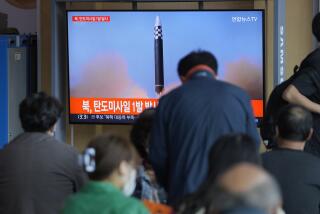Like Pakistan, India May OK Test-Ban Treaty
- Share via
WASHINGTON — Under international pressure to curb nuclear tensions in South Asia, India indicated publicly for the first time Thursday that it aims to complete negotiations so a global nuclear test-ban treaty can go into effect within a year.
But in an address at the U.N. General Assembly in New York, Indian Prime Minister Atal Bihari Vajpayee did not specifically promise to sign the accord, a key component of international efforts to end the nuclear arms race. His speech appeared more ambiguous than the pledge made Wednesday by Pakistan’s prime minister, Nawaz Sharif, who said his country was “prepared to adhere” to the treaty as long as India refrained from further tests.
Vajpayee said only that India was “prepared to bring . . . discussions” on the Comprehensive Test Ban Treaty “to a successful conclusion” so that the treaty can go into effect by September 1999.
India voted against formation of the treaty at a U.N. conference in 1996. Pakistan voted for the treaty.
Vajpayee did not list specific conditions for further negotiations in his U.N. speech, as Sharif had. Both leaders repeated previous pledges to refrain from further tests and any exports of sensitive technology or equipment.
A senior U.S. official called the speeches “movement in the right direction” but said neither nation had gone far enough toward joining international nonproliferation and control efforts for Congress to lift economic sanctions imposed after first India, and then Pakistan, exploded a series of underground nuclear devices in May.
“We certainly had hoped that both prime ministers would come and say we’re going to sign [the treaty] now, or we’re going to sign it by September 1999,” said another U.S. official. “That’s not what they said. Frankly, I’m scratching my head, trying to figure out what they did say.”
The test-ban treaty must be ratified by the 44 nations with nuclear power before September 1999, or it will not attain the force of international law. India, Pakistan and North Korea are the only nations with nuclear weapons or capabilities that have not signed the accord.
In talks in Islamabad, New Delhi, Washington and New York, the United States has urged India and Pakistan to sign the test-ban treaty, to join the Conference on Disarmament talks in Geneva to ban production of fissile material for nuclear weapons, to bar exports of nuclear technology and to refrain from building or deploying nuclear weapons.
U.S. scientists have questioned the number and strength of the devices India and Pakistan claimed to have tested in the spring. But London-based Jane’s Intelligence Review, a leading defense journal, reported this week that if India used reactor-grade as well as weapons-grade plutonium, it potentially had enough fissile material to build 455 atomic bombs, far more than previously believed. The journal also estimated that Pakistan could build up to 100 bombs, four times more than previously believed.
Experts in South Asian affairs appeared divided as to how much real progress had occurred at the United Nations.
“Both public postures are indirect and convoluted,” said Michael Krepon, president of the Henry L. Stimson Center, a public policy think tank in Washington. “But they lead to the same place--a public commitment to formally join the test-ban treaty by the fall of 1999. That’s positive.”
Others suggested that the two speeches contained enough vagueness, loopholes and potential snags to give either leader maneuvering room to placate political critics and foes back home.
“It gives Mr. Vajpayee a way to deny any particular interpretation,” said Paula Newberg, an expert on the region.
Morton H. Halperin, senior vice president of the Century Foundation in Washington, said India and Pakistan have put the onus on Congress to pass legislation before adjourning next month so the White House can move independently to lift or ease the sanctions triggered by the May tests. Under current law, only Congress has authority to remove the sanctions.
“I think both India and Pakistan are saying they want to move, but they are looking for something from us,” Halperin said. “If they sign the test-ban treaty tomorrow, the president still can’t lift the sanctions.”
The focus on the regional nuclear standoff overshadowed progress India and Pakistan have made on other issues. On Wednesday, Vajpayee and Sharif met for two hours, their longest meeting ever, then emerged with smiles to announce a resumption of long-frozen talks over the future of the bitterly contested Himalayan border state of Kashmir.
The two leaders agreed to reopen closed transportation links, to tone down hostile propaganda in government media, to revive a crisis communications “hot line” and, most important, to halt the increasingly fierce artillery duels over the so-called line of control that separates the two nations in Kashmir.
By some accounts, the last few months have seen the heaviest exchange of fire in Kashmir in years. India and Pakistan have fought three wars, including two over Kashmir, since winning independence from Britain in 1947.
“My government is committed to resolving our problems with India through dialogue,” Sharif said Wednesday. “This is all the more important in a nuclear environment in which neither side has the luxury to contemplate the use of force.”
Times staff writer Craig Turner at the United Nations contributed to this report.
More to Read
Sign up for Essential California
The most important California stories and recommendations in your inbox every morning.
You may occasionally receive promotional content from the Los Angeles Times.











